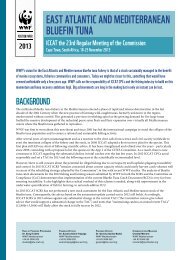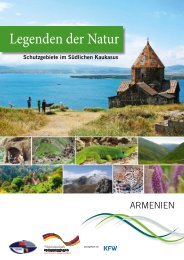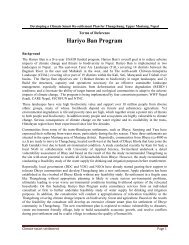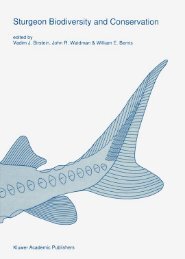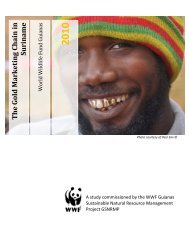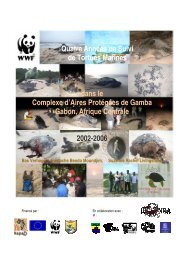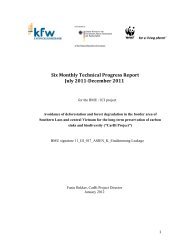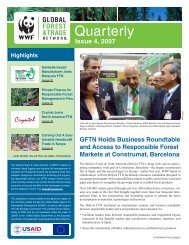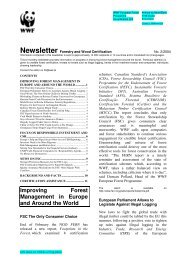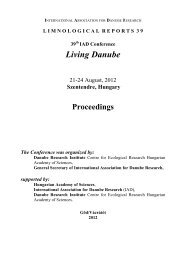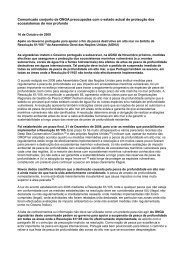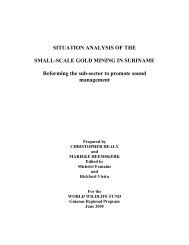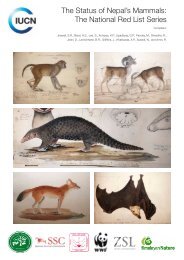The South Africa – Viet Nam Rhino Horn Trade Nexus (PDF ... - WWF
The South Africa – Viet Nam Rhino Horn Trade Nexus (PDF ... - WWF
The South Africa – Viet Nam Rhino Horn Trade Nexus (PDF ... - WWF
You also want an ePaper? Increase the reach of your titles
YUMPU automatically turns print PDFs into web optimized ePapers that Google loves.
situation at the source: south africa<br />
• <strong>The</strong> implementation of a secure, national, electronic permit system for all activities related to threatened<br />
and protected species, specifically rhinos: <strong>The</strong> Department of Environmental Affairs has repeatedly<br />
promised the long-awaited development of a national, integrated, electronic permitting system to<br />
authorize and monitor restricted activities related to threatened and protected species, including the<br />
regulation of rhino. Delays, abuse and miscommunications within the current permitting structure<br />
have provided loopholes and opportunities for illegal or unintended activities to proliferate. A national<br />
permit database, linked to the rhino horn stockpile database (Milledge, 2004) and the RhoDIS system<br />
(Harper, 2011), would provide much greater transparency for monitoring rhino numbers and trends,<br />
horn stockpiles information and all restricted activities relating to rhinos. Streamlining the process<br />
through which permissions are granted would hopefully enhance buy-in from private rhino owners<br />
and ease identification of those abusing the system. Furthermore, the TOPS permitting process needs<br />
to be reviewed with a view to finding a more streamlined process that incentivizes private landowners<br />
to participate. Over-regulation will not necessarily provide the desired outcome of a co-operative private<br />
sector. <strong>The</strong> majority of private rhino owners who are fully compliant ought to be rewarded with<br />
more efficient and simplified approval processes.<br />
Concerning policy and legislation<br />
• <strong>The</strong> mandatory registration, marking and DNA sampling of all legally-owned or -held rhino horn stocks:<br />
<strong>The</strong> amended Norms and Standards relating to the trophy hunting of White <strong>Rhino</strong>s and the marking<br />
of horns legally mandates any owners or custodians of rhino horn to thoroughly mark, micro-chip,<br />
register and take DNA samples from any horns in their possession. It is of paramount importance that<br />
all rhino stakeholders in <strong>South</strong> <strong>Africa</strong> engage in this process to ease the differentiation of the legal and<br />
illegal horns and their origin and movements. Specifically, greater transparency and buy-in is required<br />
from the private sector and all private stakeholders are urged to take responsibility for their horn stocks<br />
and participate in this process.<br />
• <strong>The</strong> importance of developing and implementing bilateral treaties to promote collaborative law enforcement<br />
action: Greater collaboration between the supply and demand sides of the illegal trade chain<br />
is essential for combating rhino crime. Government officials from <strong>South</strong> <strong>Africa</strong> and <strong>Viet</strong> <strong>Nam</strong> have<br />
undertaken two bi-lateral exchanges over the past couple of years, but the proposed Memorandum of<br />
Understanding for law enforcement co-operation between the two countries remains unsigned. This<br />
needs to be addressed as a matter of urgency as <strong>Viet</strong> <strong>Nam</strong> is more heavily implicated in the <strong>South</strong> <strong>Africa</strong>n<br />
rhino crisis than any other single country in the world. Additionally, it is becoming increasingly<br />
clear that Mozambique appears to form a significant and growing link in the rhino horn trade chain.<br />
Strengthening protocols and mechanisms between <strong>South</strong> <strong>Africa</strong> and Mozambique for collaborative<br />
and co-ordinated responses to the rhino poaching and rhino horn trade threat is also an urgent priority.<br />
Specifically, an extradition treaty under which those suspected of rhino poaching or rhino horn<br />
trafficking from Mozambique can be extradited to <strong>South</strong> <strong>Africa</strong> urgently needs to be developed and<br />
implemented. Finally, on another level, there needs to be greater international co-operation to ensure<br />
that confiscated rhino horn, particu larly from consumer countries, is sampled and sent to <strong>South</strong> <strong>Africa</strong>’s<br />
RhoDIS database for DNA analysis in order to facilitate investigations and possible prosecutions.<br />
• <strong>The</strong> necessity of ensuring that appropriate penalties that serve as a deterrent are given to those convicted<br />
of rhino crimes: <strong>The</strong> potential of high black-market prices for rhino horn, and the subsequent highincome<br />
generation possible from illegal trading, mandates the necessity of imprisonment and asset<br />
forfeiture in place of fines if suitable penalties for deterring rhino crime are to be effected. Recently,<br />
severe prison sentences and large-scale asset forfeiture have been imposed on those believed to have<br />
profited from illegal trade in rhino horn. Praise must be given where it’s due to those in the NPA, SAPS,<br />
SARS and other government departments who have made great strides in this key area and enacted<br />
suitable deterrents. <strong>The</strong>re have also been recent positive developments in the denial of bail to those<br />
charged with serious rhino crime, especially foreign nationals apprehended in <strong>South</strong> <strong>Africa</strong>, and such<br />
action should be considered as a precedent for such offences in the future. Greater consistency in this<br />
kind of approach should be mandated by those in the judiciary in all provinces to ensure a committed<br />
and standardized hard-line response. Given the exceptional prices paid for horn by the end-user, it is<br />
critical that any punishment meted out is commensurate with the crime itself so that those profiteering<br />
from illegal trade in rhino horn are hit where it hurts. Other rhino range States, such as Kenya and<br />
Zimbabwe, also need to consider this approach in addressing the current rhino crisis.<br />
White <strong>Rhino</strong> being protected by game ranger.<br />
• <strong>The</strong> importance of denying those charged with outstanding rhino crime cases continued legal access to<br />
permits for restricted activities with TOPS species, especially where rhinos are concerned: Several prominent<br />
members of the game ranching industry currently awaiting trial for rhino crimes are out on bail and<br />
continue to obtain permits for restricted activities related to rhinos and other threatened or protected<br />
species, including the purchase of rhinos at government game auctions and the pursuit of White <strong>Rhino</strong><br />
“pseudo-hunting” operations with Asian clients. <strong>The</strong>se individuals are allowed to buy, sell, hunt and<br />
dehorn rhinos, despite strong evidence indicating that they have been highly involved in illegal activities<br />
associated with these very actions. Whilst there are no doubt constitutional issues that need to be<br />
carefully considered, the <strong>South</strong> <strong>Africa</strong>n government should investigate legal options available to national<br />
and provincial authorities in terms of implementing a ban on the provision of TOPS permits to anyone<br />
charged with wildlife crimes, especially where rhino crime is concerned. Notwithstanding the notion<br />
of “innocent until proved guilty”, there are already a number of legal precedents in <strong>South</strong> <strong>Africa</strong> which<br />
buttress this consideration. For example, individuals facing criminal charges for armed robbery offences<br />
can be denied permits for the purchase of a gun; drivers with unresolved proceedings for allegedly driving<br />
under the influence of alcohol can have the renewal of their driver’s licences blocked; and teachers<br />
charged with sex offences involving a minor can be denied teaching opportunities until a final verdict is<br />
rendered (R. Coetzee, pers. comm., 2012).<br />
Concerning law enforcement and regulation<br />
TIM jACkSON/AFRICA GEOGRAPHIC<br />
• <strong>The</strong> imperative of improving scene of crime investigative capacity and intelligence gathering and analysis:<br />
Despite the positive increase seen in arrests thus far in 2012, there is still much room for improvement<br />
to be made in this realm, particularly with regard to investigating the middlemen and kingpins operating<br />
at higher levels of the trade chain. For example, whilst a number of Asian nationals have been<br />
arrested and documents, cell phones and computers seized, if information is in Chinese or <strong>Viet</strong>namese<br />
languages, it typically is never analysed to become a proactive part of the investigation. It is believed<br />
that much valuable and relevant information is lost through the lack of capacity to work in foreign<br />
languages. <strong>The</strong> NWCRU should promote and co-ordinate a more holistic and centralized approach<br />
to intelligence gathering and standardized investigative procedures. Laudably, the DPCI is currently<br />
engaged in better analysis of all open dockets to amass information that might be related to rhino<br />
108 the south africa <strong>–</strong> viet nam rhino horn trade nexus TRAFFIC 109



